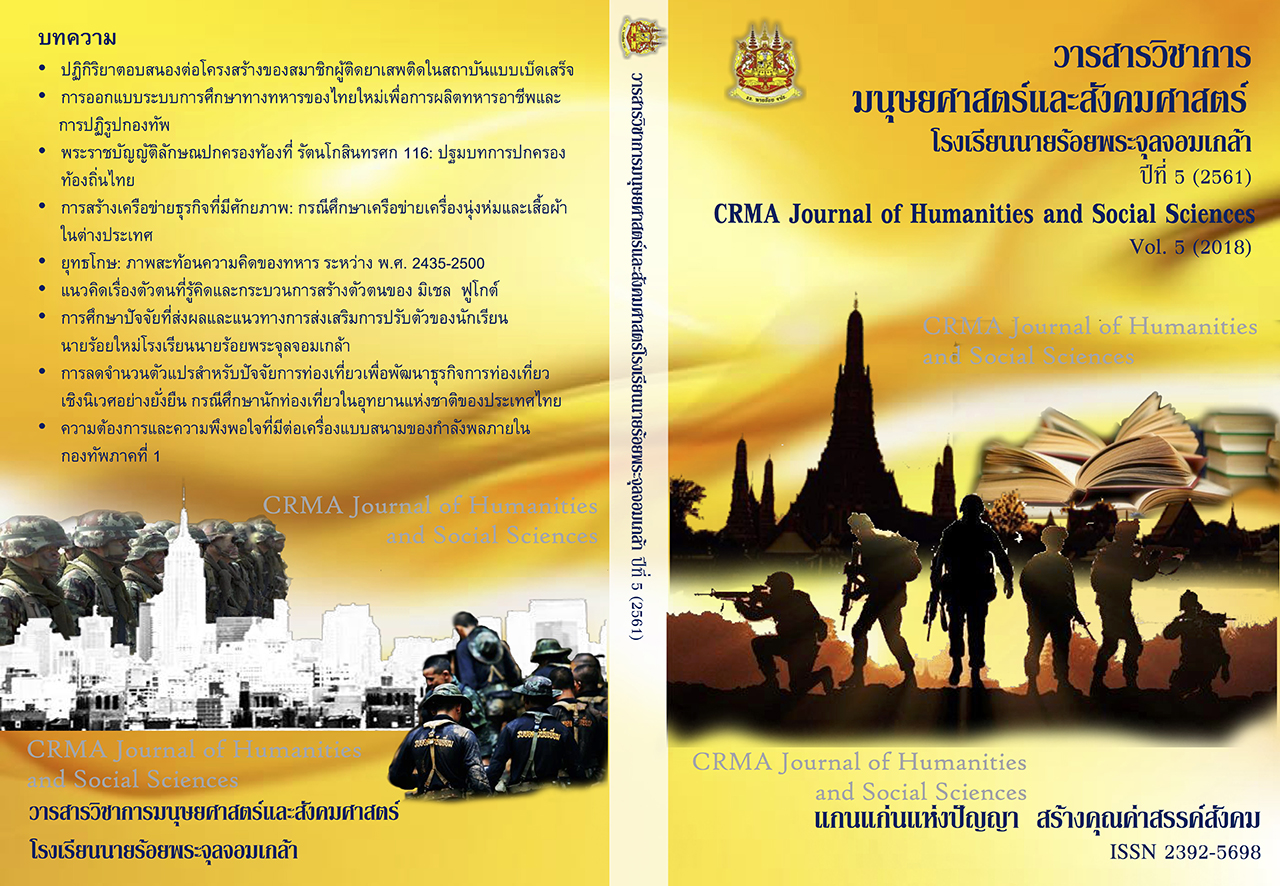Foucault’s Concept of Subjectivity and the Process of Subjectification
Keywords:
Michel Foucault, Subjectivity, Technology of SelfAbstract
Michel Foucault’s studies on the concepts of subjectification are an attempt to overcome the limitations placing by human sciences throughout the history. These limitations are formed under the epistemological framework that based on the studies on empirical and hermeneutic concepts, which emphasize on rational and structural ideas. As a result, human is scattered across various fields, making it is difficult to understand. Due to this issue, Foucault introduced a new concept to study the human sciences, which he termed “archaeology” or the study of discursive and non - discursive formation; their links to particular knowledge and the historical process of discourse from the past to the present. Then, Foucault provided another concept calling “genealogy” to connect his study of knowledge with the mechanisms of power. According to these two concepts, Foucault recognized that human are no longer the author of their own stories. Contradicting with the main belief at that time, he believed that human’s subjectivity is not fixed however, it is fluid and changeable depending on the social conditions and self - consciousness. For him, human’s subjectivity from the field of power and relies on the relation of power within the society whereas, individuals have the ability to shape up their own self, using the arts of existence and ethic that each person possesses. He referred to this process of subjectification as the technologies of the self, which individuals can use to overcome the subjugation and become the master of their subjectivity.
References
จิตติมา เจือไทย. (2551). การก้าวข้ามสู่สุนทรียะแห่งตัวตนของคนพิการ. วารสารลุ่มน้ำโขง, 4 (2), 81 - 102.
ชิเกฮารุ ทานาเบ. (2551). ชุมชนกับการปกครองชีวญาณ: กลุ่มผู้ติดเชื้อเอชไอวีในภาคเหนือของไทย. กรุงเทพฯ: ศูนย์มานุษยวิทยาสิรินธร.
ไชยรัตน์ เจริญสินโอฬาร. (2545). สัญวิทยา โครงสร้างนิยม หลังโครงสร้างนิยมกับการศึกษารัฐศาสตร์.กรุงเทพฯ: วิภาษา.
ไชยรัตน์ เจริญสินโอฬาร. (2560). วาทกรรมการพัฒนา: อำนาจ ความรู้ ความจริง เอกลักษณ์ และความเป็นอื่น = Development Discourse: Power Knowledge Truth Identity and Otherness (พิมพ์ครั้งที่ 6). กรุงเทพฯ: วิภาษา.
-------- (2561). วาทกรรมกับอำนาจ. ใน อำนาจไร้พรมแดน ภาษา วรรณกรรม ชีวิตประจำวันและโลกที่เปลี่ยนแปลง (หน้า 71 - 148). กรุงเทพฯ: วิภาษา.
ทองกร โภคธรรม และนพพร ประชากุล. (2547). ร่างกายใต้บงการ. กรุงเทพฯ: คบไฟ.
ธงชัย วินิจจะกูล. (2558). การศึกษาประวัติศาสตร์แบบสาแหรก วิธีการศึกษาประวัติศาสตร์ของฟูโกต์. ใน อ่านวิพากษ์มิเชล ฟูโกต์. กรุงเทพฯ: ศยาม.
ธเนศ วงศ์ยานนาวา. (2532). การวิเคราะห์ซับเจค (Subject) ทฤษฎีที่ใช้ทฤษฎีว่าด้วยอำนาจของมิเชล ฟูโก. กรุงเทพฯ: คณะรัฐศาสตร์ มหาวิทยาลัยธรรมศาสตร์.
---------- (2548). การสร้าง "ซับเจค": บทวิพากษ์ Foucault และการวิเคราะห์ "ซับเจค" จากภาพ Las Meninas กรุงเทพฯ: คณะรัฐศาสตร์ มหาวิทยาลัยธรรมศาสตร์
ธีรยุทธ บุญมี. (2551). มิเชล ฟูโกต์ (Michel Foucault). กรุงเทพฯ: วิภาษา.
เบญจวรรณ อุปัชฌาย์. (2558). นักสิ่งแวดล้อมที่รู้คิด: สิ่งประดิษฐ์สร้างทางการปกครองเพื่อการรักษาสิ่งแวดล้อมที่ยั่งยืน. วารสารการจัดการสิ่งแวดล้อม, 11 (2), 24 - 43.
แบรี่ สมาร์ท. (2555). มิเชล ฟูโกต์ (จามะรี เชียงทอง และสุนทร สุขสราญจิต แปล). กรุงเทพฯ: ศูนย์มานุษยวิทยาสิรินธร (องค์การมหาชน).
วรฉัตร วริวรรณ. (2559). การสร้างตัวตนของชาวนาอินทรีย์. วารสาร มจร สังคมศาสตร์ปริทรรศน์, 5 (2), 367 - 382.
สายพิณ ศุพุทธมงคล. (2545). คุกกับคน: อำนาจและการต่อต้านขัดขืน (พิมพ์ครั้งที่ 2). กรุงเทพฯ: สำนักพิมพ์มหาวิทยาลัยธรรมศาสตร์.
อานันท์ กาญจนพันธุ์. (2555). คิดอย่างมิเชล ฟูโกต์ คิดอย่างวิพากษ์ จากวาทกรรมของตัวตนถึงจุดเปลี่ยนของอัตตา. กรุงเทพฯ: สำนักพิมพ์มหาวิทยาลัยเชียงใหม่.
Agrawal, A. (2005). Environmentality: Technologies of Government and the Making of Subject. Durham: Duke University Press.
Atkins, K. (2005). Commentary on Descartes. In K. Atkins (Ed.), Self and Subjectivity (pp.7 - 11). Oxford: Blackwell.
------------ (2005). Commentary on Kant. In K. Atkins (Ed.), Self and Subjectivity (pp. 47 - 51). Oxford: Blackwell.
Baker, C., & Jane, E. A. (2016). Issues of Subjectivity and Identity. Cultural Studies: Theory and Practice (5 ed.). London: SAGE.
Boucher - Bonnafous, M. (2010). The Concept of Subjectivation: A Central Issue in Governmentality and Government of the Self. In S. Binkley & J. Capetillo (Eds.), A Foucault for the 21st Century Governmentality, Politics and Discipline in the New Millennium. Cambridge: Cambridge Scholars Publishing.
Burchell, G., Gordon, C., & Miller, P. (1991). The Foucault Effect: Studies in Governmentality. London: Haverster Weatsheaf.
Cruikshank, B. (1996). Revolutions within: Self - Government and Self - Esteem. In B. Andrew, O. Thomas & r. Nikolas (Eds.), Foucault and Political Reason: Liberalism, Neo - Liberalism and Rationalities of Government (pp. 231 - 251). Chicago: University of Chicago Press.
Danaher, G., Schirato, T., & Webb, J. (2000). Art of the Self. Understanding Foucault. London: SAGE.
Dean, M. (2010). Governmentality: Power and Rule in Modern Society (2 ed.). London: SAGE.
Foucault, M. (1977). Discipline and Punish: The Birth of a Prison. London: Allen Lane.
---------- (1980). Power/Knowledge: Selected Interviews and Other Writings, 1972-1977. New York: Panteon.
---------- (1983a). On the Genealogy of Ethics: An Overview of Work in Progress. In H. L. Dreyfus & P. Rabinow (Eds.), Michel Foucault: Beyond Structuralism and Hermeneutics (2 ed.). Chicago: The University of Chicago Press.
----------- (1983b). The Subject and Power. In H. L. Dreyfus & P. Rabinow (Eds.), Michel Foucault: Beyond Structuralism and Hermeneutics (2 ed.). Chicago: The University of Chicago Press.
---------- (1984). What is Enlightenment? In P. Rabinow (Ed.), The Foucault Reader. New York: Pantheon Books.
---------- (1990a). The History of Sexuality Volume 1: An Introduction. New York: Vintage Books.
---------- (1990b). The History of Sexuality Volume 2: The Use of Pleasure (R. Hurley, Trans.). New York: Vintage Books.
---------- (1990c). The History of Sexuality Volume 3: The Care of the Self. London: Penguin Books.
---------- (1991). Governmentality. In G. Burchell, C. Gordon & P. Miller (Eds.), The Foucault Effect: Studies in Governmentality. Chicago: The University of Chicago Press.
---------- (1994). The Order of Things: An Archaeology of the Human Sciences. New York: Vintage Books.
---------- (1997). The Hermeneutics of the Subject. In P. Rabinow (Ed.), The Essential Works of Michel Foucault V.1 Ethics: Subjectivity and Truth. New York: The New Press.
---------- (2002). The Archeology of Knowledge. (A. Sheridan, Trans.). London: Routledge.
---------- (2003). The Birth of the Clinic. London: Routledge.
----------- (2004). Technology of the Self. In the Aberdeen Body Group (Ed.), The Body: Critical Concepts in Sociology (Vol.1). New York: Routledge.
---------- (2008). The Birth of Biopolitics. Lectures at College de France 1978-1979. (G. Burchell, Trans.). New York: Palgrave Macmillan.
Gibson, K. (2001). Regional Subjection and Becoming. Environment and Planning, D 19, 639 - 667.
Gordon, C. (1991). Governmental Rationality: An Introduction. In G. Burchell, C. Gordon & P. Miller (Eds.), The Foucault Effect: Studies in Governmentality. Hemel Hempstead: Haverster Weatsheaf.
Legg, S. (2005). Foucault's Population Geographies: Classifications, Biopolitics and Governmental Spaces. Population, Space and Place 11, 137 - 156.
Lemke, T. (2011). Beyond Foucault: From Biopolitics to the Government of Life. In Brockling, U.; Krasmann, S. & Lemke, T. (Ed.), Governmentality Current Issues and Future Challenges. New York: Routledge.
--------- (2002). Foucault, Governmanetality and Critique, Rethinking Marxism. 14 (3), 49 - 64.
Luke, T. W. (1996). Governmentality and Contragovernmentality: Rethinking Sovereignty and Territoriality After the Cold War. Political Geography, 13, 491 - 507.
MacKinnon, D. (2000). Managerialism, Governmentality and the State: Neo - Foucauldian Approach to Local Economic Governance. Political Geography, 19, 293 - 314.
Malette, S. (2010). Green Governmentality and Its Closeted Metaphysics: Toward an Ontological Relationality. University of Victoria.
Markula, P., & Pringle, R. (2006). The Technologies of the Self. Foucault, Sport and Exercise: Power, Knowledge and Transforming the Self. New York: Routhledge.
Mckee, K. (2009). Post - Foucauldian Governmentality: What Does It Offer Critical Social Policy Analysis? Critical Social Policy, 29 (3), 465 - 486.
McNay, L. (1996). Foucualt: A Critical Introduction. Cambridge: Polity Press.
Mitchell, K. (2003). Educating the National Citizen in Neoliberal Times: from the Multicutural Self to the Strategic Cosmopolitan Transactions of the Institute of British Geographers, NS 25, 65 - 76.
Milchman, A., & Rosenberg, A. (2010). The Final Foucault: Government of Others and Government of the Self. In S. Binkley & J. Capetillo (Eds.), A Foucault for the 21st Century. Newcastle: Cambridge Scholars Publishing.
Rabinow, P. (1984). Introduction. In P. Rabinow (Ed.), The Foucault Reader. New York: Pantheon Books.
Rose, N. (1999). Power of Freedom: Reframing Political Thought. Cambridge: The United Kingdom at the University Press.
Rose, N., & Miller, P. (2008). Governing the Present: dministering Economic, Social and Personal Life. Cambridge: Polity.
Rutherford, S. (2007). Green Governmentality: Insights and Oppotunities in the Study of Nature's Rule. Progess in Human Geography, 31 (3), 291 - 307.
Shama, D. (2011). Re(art)iculating Empowerment: Cooperative Explorations with Community Development Workers in Pakistan. Toronto: The University of Toronto.
Downloads
Published
How to Cite
Issue
Section
License
The content and information in this journal shall be considered as the individual opinions of the authors. In all cases, the editorial board may not necessarily agree with these opinions or be responsible for them.
The articles and information that are published in the journal are considered to be the copyright of the journal. Any party who wishes to re-publish the journal’s articles must seek permission from the journal’s editor. Articles that receive the agreement for publications must not appear in any other publications prior to their appearance in this journal. The editorial board will send one copy of the journal to each author whose submission was accepted and published.







